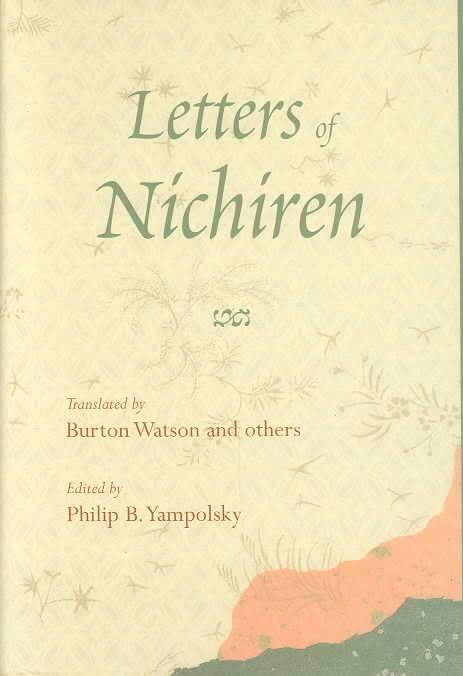Letters of Nichiren
Translated by Burton Watson and others
Edited by Philip B. Yampolsky
Columbia University Press: New York, 1996.
584 pp., $47.50 (cloth).
Burton Watson’s translation of the collected letters of Nichiren reminds me of an archaeological excavation, whereby a whole cross section of thirteenth-century Japan is laid bare. Here, too, the goal is mainly to preserve historical artifacts. Nichiren’s letters to his disciples have been expertly sorted and catalogued, and they tell an enigmatic story about the time in which he lived. Through Watson’s lyrical skill as a translator, Nichiren’s own voice has found its way into the English language.
In thirteenth-century Japan, a time of social and political upheaval, Nichiren was one of several outspoken reformers who took it upon themselves to rescue Buddhism from the heavily formalized monastic instituions that guarded it. To make Buddhism available to people at every social level demanded a radical simplification of both doctrine and practice. Nichiren’s solution was absolute faith in the Lotus Sutra as the one true path to salvation, expressed through the practice of invoking its name through the devotional formula “Nam-myoho-renge-kyo.” Nichiren had received his monastic training as a Tendai monk, and though he later split off from traditional Tendai Buddhism, he saw his teachings as a reform movement, a renewal of the original spirit of the Tendai teachings brought to Japan from China in the ninth century. In effect, though, Nichiren succeeded in creating a new form of Buddhism that might be more accurately labeled “Nichirenism,” a religion unto itself. In the eyes of his followers, Nichiren’s struggles fulfill the Buddha’s predictions of persecution and hostility toward the Lotus Sutra and its true believers, just as, for Christians, Jesus Christ fulfills the prophecies of the Old Testament.
Because of his sweeping condemnation of all the other Buddhist sects of his time—Pure Land, Shingon, Zen—Nichiren was harshly persecuted by his contemporaries. The leaders of his country first attempted to execute him and then sent him into exile. (He blamed their refusal to take faith in the Lotus Sutra as the cause of both present and future calamities, including Mongol invasions, a widespread epidemic, and natural disasters such as earthquakes.) But Nichiren’s persecution also ennobled him in the eyes of his followers. More than once he quotes a prophetic passage from the sutra: “‘Since hatred and jealousy toward this sutra abound even during the lifetime of the Buddha, how much worse will it be in the world after his passing!'” Nichiren delights in adversity because it proves that he is who he claims to be, the one true votary of the Lotus Sutra in Japan.
Now I, Nichiren, am not a worthy, let alone a sage. I am the most perverse person in the world. However; my actions seem to be in exact accord with what the sutra teaches. Therefore, whenever I meet great difficulties, I am more delighted than if my deceased parents had returned to life, or than one who sees the person he hates meet with some mishap. I am overjoyed that I, a foolish man, should be regarded as a sage by the Buddha.
A prolific letter writer, Nichiren addresses his disciples’ individual problems with tender concern, and his teachings take shape as vivid and spontaneous personal essays. The same themes keep resurfacing: persecution, warnings of peril for the nation, faith in the Lotus Sutra and its promise of salvation. He frequently cautions his followers to stay away from the other schools of Buddhism, which he regards with contempt. At times his tone becomes shrill and hostile, and the letters start to run together as one long, angry diatribe. Nonetheless, we can well imagine the corruption of the priests whom Nichiren saw controlling the Buddhist temples all around him at that time, and he expresses himself nowhere more brilliantly than when denouncing his contemporaries.
[To uphold these men’s teachings instead of the Lotus Sutra] is like exchanging a gem for a pebble or trading sandalwood for common lumber. Because Buddhism has now become thoroughly confused, the secular world has also been plunged into corruption and chaos. Buddhism is like the body and society like the shadow. When the body is crooked, so is the shadow. How fortunate that all my disciples who follow the Buddha’s true intention will flow naturally into the ocean of all-encompassing wisdom! But the Buddhist scholars of our time put their faith in teachings expounded according to the people’s capacity and are therefore doomed to sink into the sea of suffering.
For Nichiren the secular world is a shadow of the spiritual one, and he keeps a close eye on the movements of both. “The true path of life lies in the affairs of this world,” he writes. He is especially concerned with the dire political and social consequences of misguided faith. No calamity occurs by chance, and he makes gloomy predictions about Japan’s future, watching helplessly as his country sinks down into the “hell of incessant suffering.” For Nichiren, it seems, conflict is inescapable—the Lotus Sutra is pitted against all other sutras, and Nichiren against all other Buddhist teachers.
Nichiren’s views stand out as wildly politically incorrect against the backdrop of American standards of religious pluralism. Yet on a deeper level, Americans can identify with his concern for the social and political realm. The reader who seeks a more universal spiritual wisdom, though, may feel disappointed. Nichiren’s passionate tirades leave us at a crossroads—either to heed his message and become a devotee, or to remain on the outside and study him as a natural phenomenon, a sort of crystallization of the spirit of his time. The non-devotee might be better advised to put down this book and pick up a copy of Watson’s elegant translation of the Lotus Sutra instead. Its poetry delivers what Nichiren can only promise.
Thank you for subscribing to Tricycle! As a nonprofit, we depend on readers like you to keep Buddhist teachings and practices widely available.
